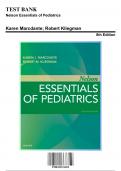Exam (elaborations)
Test Bank for Nelson Essentials of Pediatrics, 8th Edition by Kliegman, 9780323511452, Covering Chapters 1-26 | Includes Rationales
Test Bank for Nelson Essentials of Pediatrics, 8th Edition by Kliegman, 9780323511452, Covering Chapters 1-26 | Includes Rationales
[Show more]



